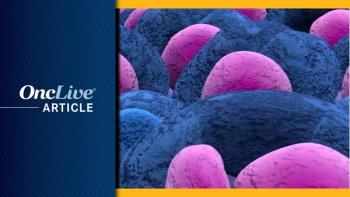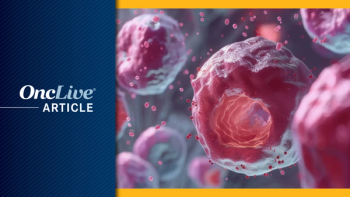
FDA Requests Additional Data for Rociletinib in EGFR T790M-Mutant NSCLC
The FDA has requested additional clinical trial data to support a new drug application for rociletinib as a potential therapy for pretreated patients with EGFR T790M mutation-positive NSCLC.
Patrick J. Mahaffy
The FDA has requested additional clinical trial data to support a new drug application (NDA) for rociletinib (CO-1686) as a potential therapy for pretreated patients with EGFR T790M mutation-positive non—small cell lung cancer (NSCLC), according to a statement from the drug's developer, Clovis Oncology.
Clovis planned to submit the requested data for the 500-mg and 625-mg doses of rociletinib to the FDA on November 16, 2015, according to the company. The request for additional data is likely to delay a regulatory decision on the medication by 90 days. Prior to this development, the FDA had granted rociletinib a priority review and an action date of March 30, 2016.
“We remain confident in rociletinib and its potential to treat patients with mutant EGFR T790M-positive lung cancer," Patrick J. Mahaffy, president and CEO of Clovis Oncology, said in a statement. “We will continue to work diligently with the FDA on our NDA submission.”
The NDA for rociletinib was based on data from the ongoing phase I/II TIGER-X trial, which was presented at the 2015 ASCO Annual Meeting. In this analysis of the data, patients with T790M-mutant NSCLC who received rociletinib at the 500 mg dose (n = 48) had an objective response rate (ORR) of 60% and a disease control rate (DCR) of 90%.
As an ongoing trial, some of the datasets submitted to the FDA contained immature findings, specifically for unconfirmed and confirmed response rates. At a preplanned 90-day meeting with the FDA, Clovis provided updated response rates, initiating the call for a more thorough review.
According to the updated data from Clovis, evaluable patients treated with the 500 mg dose of rociletinib (n = 79), experienced a confirmed response rate of 28%. In 170 patients treated with the 625 mg dose, the confirmed response rate was 34%. The duration of response for both doses was 9 months.
The company noted that a majority of responses could not be confirmed at subsequent scans due to progression, which frequently manifested as brain metastases. Additionally, scans did not continue to show tumor shrinkage of >30%.
“As the efficacy data have matured, the number of patients with an unconfirmed response who converted to a confirmed response was lower than expected,” Mahaffy said.
In the TIGER-X trial, 456 patients with EGFR-positive NSCLC received rociletinib across 4 doses (range, 500-1000 mg). The median age of patients was 63 years, 10% had a prior history of diabetes, and 41% had CNS metastases. The median prior number of therapies was 2 and nearly half of patients had received more than one TKI (44%).
In the earlier data presented at the 2015 ASCO Annual Meeting, patients with T790M mutations (n = 243) experienced an ORR across all dose levels of 53% and the DCR was 85%. At a data cutoff of April 27, 2015, the median progression-free survival (PFS) in evaluable patients with T790M mutations across the 500- and 625-mg doses (n = 270) was 8.0 months. In those without baseline CNS metastases, the median PFS was 10.3 months.
In the updated safety analysis, the most frequently occurring all-grade adverse events (AEs) in the 500-mg arm were hyperglycemia (35%), diarrhea (33%), fatigue (29%), decreased appetite (15%), muscle spasms (14%), weight loss (10%), and vomiting (8%).
Grade 3 QTc prolongation was seen in 2.5% of patients. No cases of interstitial lung disease were seen at the 500-mg dose level. AEs leading to treatment discontinuation were seen in 2.5% of patients with the 500 mg dose.
Grade 3/4 hyperglycemia occurred in 17% of patients treated with the 500-mg dose. To adjust for this, a monitoring and treatment algorithm was put in place to detect glucose levels and initiate treatment with oral insulin sensitizing agents, when needed. Prior to initiating these measures in September 2014, the rate of grade 3/4 hyperglycemia was 22%. With proper monitoring and treatment, this rate dropped to 8%.
In addition to TIGER-X, data for rociletinib were submitted from the single-arm phase II TIGER-2 trial, according to Clovis. In this ongoing study, rociletinib is being explored as a second-line therapy in patients with EGFR T790M-mutated NSCLC. Data from this study have not yet been announced, with the first patient enrolled in June 2014.
Data from the TIGER-X and TIGER-2 trials were also submitted to the European Medicines Agency for patients with pretreated EGFR T790M-mutant NSCLC. This application was granted an accelerated assessment by the Committee for Medicinal Products for Human Use.
Sequist LV, Goldman JW, Wakelee HA, et al. Efficacy of rociletinib (CO-1686) in plasma-genotyped T790M-positive non-small cell lung cancer (NSCLC) patients (pts). J Clin Oncol. 2015;33 (suppl; abstr 8001).



































